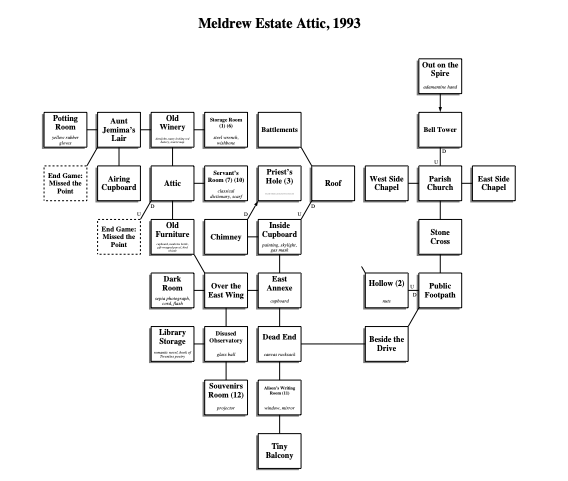From Text Adventures to Modern Interactive Fiction

50 Years of Text Games by Aaron Reed is a favorite newsletter of mine. (It’s a hard newsletter to read in your email right away, but a rewarding one to pile up and save.) It specializes in in-depth explorations, typically at a single game per newsletter, but also takes a wider view to try to understand why this game at that moment was particularly significant or representative.
Here’s an example of a great newsletter about a game I do not know well: Graham Nelson’s Curses, from 1993. Curses, Reed, argues, emerges at an unlikely moment (surrounded by emerging CD-ROM games and exploding console popularity) to bring about an equally unlikely renaissance of interactive fiction.
Curses is scavenger hunt meets Dante’s Inferno, “an allegorical rite of passage,” adventure game by way of historical footnote. It certainly owes a great debt to Infocom, recreating the company’s signature style even while literally resurrecting its technical bones…
But Nelson also took much inspiration from history and classics. When asked once about his favorite games and authors, he gave much more space to the latter, listing “Auden, Eliot, Donne, Browning, Elizabeth Bishop… For plays, Tom Stoppard, Christopher Hampton, David Hare.” Curses is steeped in antiquities, from the abandoned odds and ends squirreled away in the Meldrew attics—an old wireless radio, for instance, which seems to do nothing when turned on until you realize it just takes a few turns to warm up—to its detailed time travel excursions to lovingly researched long-ago eras. It’s a game very much about odd corners and margins: interstitial places…
Nelson’s game would take over the IF newsgroups as players who thought they’d seen the last of the great text adventures discovered a worthy modern successor. “Congratulations,” wrote one poster: “Its almost like having Infocom back.” It helped that the game had so many nooks and crannies and puzzles, endless puzzles, that at least some of them were bound to be stumpers for any given player. Hint requests and discussion of the game proliferated, and dominated the newsgroups through the rest of 1993 and 1994: so much so there was a half-hearted proposal to split it all off into a dedicated new group, rec.games.curses, just so there’d be enough oxygen to talk about anything else.
The other big thing Nelson did with Curses is build a compiler for the Infocom virtual machine so that players and designers could create their own text adventures. Kind of like Dante importing the classic epic into the vernacular. Everybody could now do it themselves.
That juncture — a compelling world, an obsessed and supportive community, and (there’s no better way to put this) the means of creative production — have proved over and over again to be the secret formula for building something beautiful and new in art.





Stay Connected